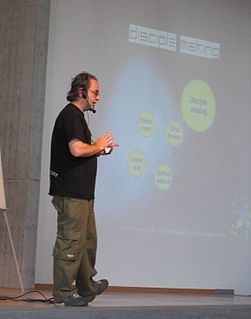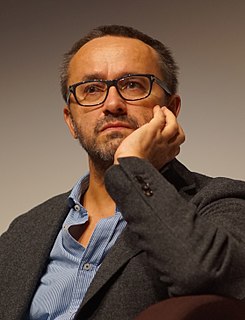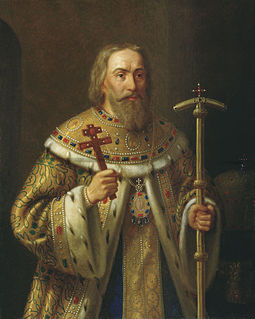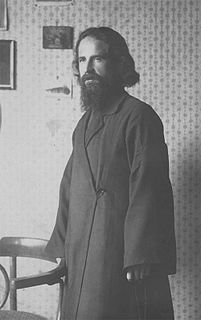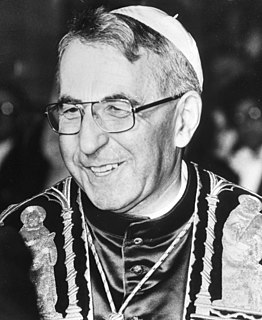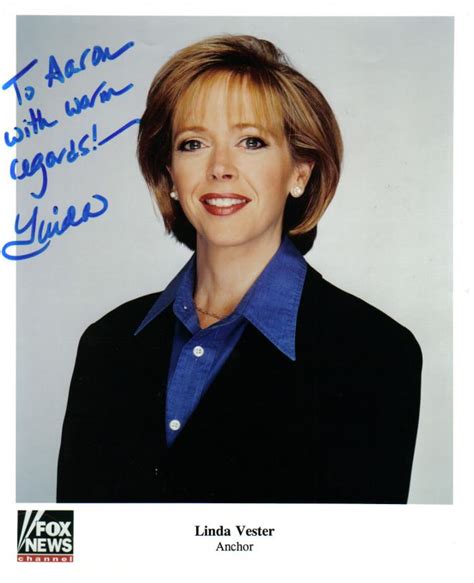A Quote by George Weigel
In the Church the transformative power of the Eucharist is experienced through the dignified celebration of Holy Mass, and people are empowered for mission because of that.
Related Quotes
Evangelization through the Eucharist, in the Eucharist, and from the Eucharist - these are three inseparable aspects of how the Church lives the mystery of Christ and fulfills her mission of communicating it to all people.... In addition to the preaching of the message, the consummation of evangelization consists in the building up of the Church, which has no real existence without the sacramental life culminating in the Blessed Eucharist
The Eucharist is not only a particularly intense expression of the reality of the Church's life, but also in a sense its fountainhead. The Eucharist feeds and forms the Church: 'Because there is one bread, we who are many are one body, for we all partake of the one bread' (1 Cor 10:17, RSV). Because of this vital link with the sacrament of the Body and Blood of the Lord, the mystery of the Church is savored, proclaimed, and lived supremely in the Eucharist.
When the church is in mission, it is the true church. The church itself is not only a product of that mission but is obligated and destined to extend it by whatever means possible. The mission of God flows directly through every believer and every community of faith that adheres to Jesus. To obstruct this is to block God's purposes in and through his people.
The world is not moved by love or actions that are of human creation. And the church is not empowered to live differently from any other gathering of people without the Holy Spirit. But when believers live in the power of the Spirit, the evidence in their lives is supernatural. The church cannot help but be different, and the world cannot help but notice.
The world could not long ignore a holy church. The church is not despised because it is holy: it is despised because it is not holy enough. There is not enough difference between the people inside the church and those outside to be impressive. A church in which saints were as common as now they are rare would convict the world, if only by contrast. Sanctity cannot be ignored. Even a little bit is potent. So far from the gates of hell prevailing against it, it hammers on their triple steel.
Church, the spiritual power, and the executive power are working today united in a system that confronts people. This alliance or cooperation between the spiritual power and the executive power, between the church and the government, unfortunately takes away the Church's basic mission. It takes away their right to speak on moral or ethical subjects.
The Church is holy, although there are sinners within her. Those who sin, but who cleanse themselves with true repentance, do not keep the Church from being holy. But unrepentant sinners are cut off, whether visibly by Church authority, or invisible by the judgement of God, from the body of the Church. And so in this regard the Church remains holy.
The holy mystery of the day of the Holy Spirit, Pentecost, is to be understood in the following manner: the spirit of man must be completed and perfected by the Holy Spirit, that is, it must be sanctified, illuminated, and divinized by the Holy Spirit. This holy mystery is realized continually in the Church of Christ and because of this the Church is really a continuous Pentecost.... From Holy Pentecost, the day of the Holy Spirit, every God-like soul in the Church of Christ is an incombustible bush which continuously burns and is inflamed with God and has a fiery tongue within it.
The priestly vocation is essentially a call to sanctity, in the form that derives from the Sacrament of Holy Orders. Sanctity is intimacy with God; it is the imitation of Christ, poor, chaste and humble; it is unreserved love for souls and self-giving to their true good; it is love for the church which is holy and wants us to be holy, because such is the mission that Christ has entrusted to it. Each one of you must be holy also in order to help your brothers pursue their vocation to sanctity.
Well, let's take what people think is a dignified death. Christ - was that a dignified death? Do you think it's dignified to hang from wood with nails through your hands and feet bleeding, hang for three or four days slowly dying, with people jabbing spears into your side, and people jeering you? Do you think that's dignified? Not by a long shot. Had Christ died in my van with people around Him who loved Him, the way it was, it would be far more dignified. In my rusty van.
Receiving the Eucharist means adoring Him whom we receive. Only in this way do we become one with Him, and are given, as it were, a foretaste of the beauty of the heavenly liturgy. The act of adoration outside Mass prolongs and intensifies all that takes place during the liturgical celebration itself.


